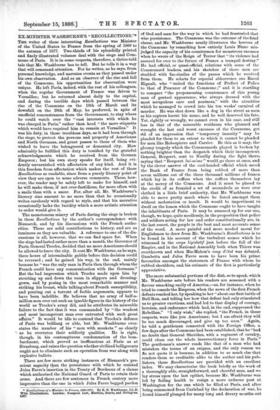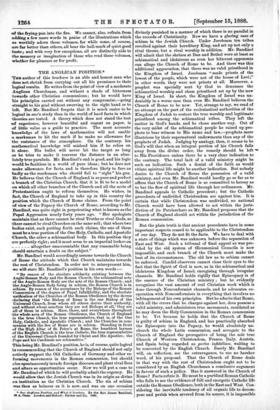EX-MINISTER WASHBURNE'S "RECOLLECTIONS."* TELE writer of these interesting Recollections was
Minister of the United States to France from the spring of 1869 to the autumn of 1877. Two-thirds of his splendidly printed and finely illustrated volumes deal with the siege and Com- mune of Paris. It is in some respects, therefore, a thrice-told. tale that Mr. Washburne has to tell. But he tells it in a way that will command attention. For he writes, as he says, from personal knowledge, and narrates events as they passed under his own observation. And as an observer of the rise and fall of the Commune, his opportunities for observation were unique. He left Paris, indeed, with the rest of his colleagues, when the regular Government of France was driven to Versailles ; but he returned almost daily to the capital, and during the terrible days which passed between the rise of the Commune on the 18th of March and its downfall on the 28th of May, he preferred, in spite of unofficial remonstrances from the Government, to stay where he could watch over the " vast interests with which he was charged in Paris," rather than heed " the mere etiquette which would have required him to remain at Versailles." It was his duty, in those troublous days, as it had been through the siege, to protect the persona and property of Americans and North Germans, and grant passes to those of them who wished to leave the beleaguered or demented city. How admirably he fulfilled this duty is testified by the grateful acknowledgments which he received from the German Emperor ; but his own story speaks for itself, being evi- dently unvarnished with affectation of any kind. And it is this freedom from affectation which makes the rest of these Recollections so readable, since from a purely literary point of view they are open to some adverse comments. These, how- ever, the reader may be safely left to make for himself, and he will make them, if not over-fastidious, far more often with a smile than with a sneer. For, after all, Mr. Washburne's literary sins amount to no more than that he occasionally writes carelessly with regard to style, and that his narrative occasionally lacks the lucidity which a more artistic attention to order would give it.
The monotonous misery of Paris during the siege is broken in these Recollections by the author's correspondence with Bismarck, and by his discussions with the French autho- rities. These are solid contributions to history, and are as luminous as they are valuable. A reference to one of the dis- cussions is all, however, that we can find space for. When the siege had lasted rather more than a month, the Governor of Paris, General Trochu, decided that no more Americans should be allowed to leave the city. It cost Mr. Washburne, as he says, three hours of interminable gabble before this decision could be reversed ; and he gained his way, in the end, mainly because he " was the only man in Paris then through whom the French could have any communication with the Germans." But the bad impression -which Trochu made upon him by strutting up and down the room in slippers and dressing- gown, and by posing hi the most remarkable manner and striking his breast, while talking about French susceptibility, and pouring out a torrent of feeble arguments, appears to have been indelible. He believes that no army of half-a- million men ever cut such an ignoble figure in the history of the world as. Trochu's army did, and he attributes its miserable failure to the fact that it was commanded by " the weakest and most incompetent man ever entrusted with such great affairs." It would be idle to contend that Trochu's defence of Paris was brilliant or able, but Mr. Washburn over- states the number of his " men with muskets " as clearly as he overrates their soldierly qualities. He is right, though, in his contemptuous condemnation of the bom- bardment, which proved as inefficacious at Paris as at Strasburg, and raises the question whether civilised belligerents ought not to eliminate such an operation from war along with explosive bullets.
There are few more striking instances of Bismarck's pre- scient sagacity than the persistence with which he resisted Jules Favre's insertion in the Treaty of Bordeaux of a clause which authorised the National Guard of Paris to retain their arms. And there are few sentences in French oratory more impressive than the one in which Jules Favre begged pardon
* Recollections of a Minister to France, 18894877. By B. B. Washburn, LL.D. With Illustrations. London: Simpson Low, Marston, Searle, and Rivington. 1887.
of God and man for the way in which he had frustrated that wise persistence. The Commune was the outcome of the fatal clause, and Mr. Washburn neatly illustrates the horrors of the Commune by remarking how entirely Louis Blanc mis- judged the capacity of his countrymen for monstrous excesses when he wrote of the Reign of Terror that " its violence had assured for ever to the future of France a tranquil destiny." He had official, or quasi-official, relations with some of the Communard leaders, and his sketches of these men are studded with fac-similes of the passes which he received from them. He selects for especial abhorrence one Raoul Rigault, who " united the functions of Prefect of Police to that of Procurer of the Commune ;" and it is startling to compare " the prepossessing countenance of this young man of genteel appearance, who always dressed with the most scrupulous care and iieatness," with the atrocities which he managed to crowd into his ten weeks' carnival of murder. He was shot down like a dog in the street as soon. as his captors learnt his name, and he well deserved his fate_ Yet, rightly or wrongly, we cannot even in his case, and still less in that of the miserable residuum who planned and wrought the last and worst excesses of the Commune, get rid of an impression that " temporary insanity " may be pleaded for them to an extent to which it cannot be pleaded. for men like Robespierre and Carrier. Be this as it may, the gloomy tragedy which the Communards played is broken by nothing brighter than the despatch which their incompetent General,. Bergeret, sent to Neuilly during the fight there, saying that. " Bergeret lui-mime" would go there at once, and by the clever answer of the cool-headed official which saved. the Bank of France from being robbed of more than seven millions out of the three thousand millions of franca which lay in its coffers when the coffers themselves lay at the mercy of the Commune. And it must be placed to the credit of as frenzied a set of scoundrels as were ever clothed in a little brief authority, that Mr. Washburne was able to move pretty much where he listed amongst them without molestation or insult. It would be impertinent to' dwell on the lesson. which the Commune ought to have taught. the inhabitants of Paris. It may be summed up for our use, though, we hope, quite needlessly, in the proposition that police and soldiers acting for law and order constitutionally are, in the last resort, the people in the best and most accurate sense of the word. A more painful and more needed moral for Englishmen to draw from Mr.. Washburne's Recollections is to be found in his account of the turbulent scenes which he witnessed in the corps legislatif just before the fall of the Empire, and in the National Assembly both when Thiers was overthrown and when MacMahon's coup d'aat was debated. Gambetta and Jules Favre seem to have been his prime favourites amongst the statesmen of France with whom he rubbed shoulders, and his estimate of the first is particularly appreciative.
The more substantial portions of the dish, so to speak, which Mr. Washburne sets before his readers are seasoned with a flavour smacking racily of America,—as, for instance, when he tried to console the Empress, when the news of the first French defeats reached her, by Speaking to her " about our first battle of Bull Run, and telling her how that defeat had only stimulated us to greater exertions, and had led to that display of courage, heroism, and endurance which had, in the end, suppressed the Rebellion." "I only wish," she replied, "the French, in these respects, were like you Americans; but I am afraid they will be too much discouraged, and give up too soon." Again, he told a. gentleman connected with the Foreign Office, a few days after the Commune had been established, that he " had no doubt that General Sheridan, with a regiment of cavalry, could clean out the whole insurrectionary force in Paris." The gentleman's, answer reads like that of a man who had mistaken the terms of an enigma, and the only reason we tlo not quote it is because, in addition to so much else that renders them so creditable alike to the author and his pub- lishers, these Recollections are provided with an excellent index. We may characterise the book briefly as the work of a thoroughly able, straightforward., and cheerful man, and we lay stress upon the last epithet, because Mr. Washburne was led by failing health to resign a more arduous post at Washington for the one which he filled at Paris, and after being summoned from Carlsbad by the declaration of war, he found himself plunged for many long and dreary months out
of the frying-pan into the fire. We cannot, also, refrain from adding a few more words in praise of the illustrations which no worthily adorn these volumes, for while some, of course, are far better than others, all bear the hall-mark of quiet good taste ; and with very few exceptions, all are distinctly aids to the memory or imagination of those who read these volumes, whether for pleasure or for profit.



































 Previous page
Previous page